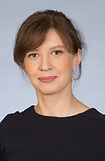
Applied Humanities and the Active Life of Literature
edited by Virginia Ramos
5.5 x 8.5, 240 pgs., $28
ISBN 978-1-962365-03-1
Purchase copies here.
"Applied Humanities and the Active Life of Literature makes visible the necessity of contemplating the 'big' questions of what makes us human in the time of tech and artificial intelligence. Instead of running away from the study of the humanities, the authors push us to consider how we remain relevant and how we not only maintain our humanity but deepen human qualities such as empathy, imagination, and storytelling. Truly a book that meets this moment and offers a counternarrative to the post-human era."
—Nicole Gonzales Howell, University of San Francisco
"What keeps us human in the digital age? This bold collection edited by Virginia Ramos argues: empathy, imagination, and stories. The humanities are now more vital than ever. Applied Humanities and the Active Life of Literature is a critical reflection on the humanities in the age of AI. A must read."
—Alain-Philippe Durand, University of Arizona
How does the study of literature, language, and humanities help build critical capacities? How do we address the current state of the humanities in the age of AI? What are examples of applied humanities programs and careers? This book project is a dialogue between academia and broader society. A collaboration of national and international scholars, Building Capacities: Applied Humanities and the Active Life of Literature is explores the engagement of universities with pressing social issues through research, teaching, public service, and the importance of literature. The volume sets out to include a diversity of voices, global perspectives, and creative styles and its topics range from in-depth data studies discussing power dynamics and identity forming in PhD students and academia at large, to the value of storytelling and narrative, to the question of how to stay human(e) in the AI era, and methodologies on reading and analyzing social media.
Contributions include:
Eralda L. Lameborshi (Texas A&M University), “The Act of Reading: TikTok, Other Social Media, and Literary Analysis”
Tingting Hui (Leiden University -Netherlands), “Stories Matter: A case study of engaging with diversity through card game”
Karolina Bagdonė (Institute of Lithuanian Literature and Folklore), “The Self-reflection of Becoming a PhD in the Anglo-American and Lithuanian Novel: A Case Study”
Lori Clinchard (De Anza College), “Staying Human(e) in the AI Era”
Sherri Harvey (Foothill College) “Decolonizing and Humanizing Education Through Travel and Adobe Express”
Marlon James Sales, Anna Sibayan-Sarmineto, and Kristine Cabling (University of the Philippines),“Specters of Europe: Colonial Pasts and Decolonial Futures in Foreign Language Teaching in the Philippines”
Didem Ekici (University of San Francisco), “The Intersection of ICC and DEI Frameworks”
Amber Kidd and Ageh Bedell (Case Western Reserve University), “Trauma-Informed Research Initiatives for Community College Students: Creating Change for Belonging Through Humanistic Inquiry”
Virginia Ramos (University of San Francisco), “Still Human”












Contributors
Adrienne (Ageh) Bedell, Ph.D. explores the intersections of music engagement, community-level adversity, and the experience of traumatic loss. As a community-based music educator, Ageh has designed music education opportunities in homeless shelters, alternative to incarceration programs, and hospital-based violence intervention programs. Her research frames active music-making as a tool for violence prevention through trauma-informed, asset-informed, and anti-oppressive teaching. Currently a Lecturer at Case Western Reserve University, Ageh teaches undergraduate-level courses on disenfranchised grief and the neurobiology of trauma. She is pursuing Grief Counseling Licensure, aiming to incorporate creative-based therapies into her practice to foster post-traumatic growth after loss.
Amber Kidd is a PhD candidate at Case Western Reserve University where she is finishing her dissertation examining representations of trauma in the works of David Jones. Her research is interested in the intersections of traumatic representation and narrative theory as reflected in modernist literature specifically, and the twentieth and twenty-first centuries more broadly. In addition to her work at CWRU, she teaches with multiple institutions in the region and is deeply invested in furtherance of trauma-informed, emancipatory pedagogy.
Eralda L. Lameborshi, is an Assistant Professor of World Literature and Film in the Department of Literature and Languages at East Texas A&M University. Her scholarly work focuses on the global novel, Eastern European literature, and world cinema, with more recent engagement in the study of the Cinema of Kosova. Lameborshi’s research has been published in prestigious academic journals including World Literature Today, Continuum, Critique: Studies in Contemporary Fiction, Journal of World Literature, and Signs: Journal of Women in Culture and Society. She is the recipient of several distinguished fellowships: the Fulbright U.S. Scholar Award to Kosova (2024–2025), the Global Human Rights Fellowship at Texas A&M University—Commerce, and the Hagler Institute for Advanced Study Fellowship at Texas A&M University—College Station. Her current research focuses on the Cinema of Kosova and Southeastern European literature. Through her Fulbright fellowship work, she aims to foster better understanding of Albanian Kosovar culture through the study of art, film, and literature, while creating connections between Kosova and its diaspora population in the United States.
Lori Clinchard, Ph.D. is Humanities Department Chair and Faculty Director of the California History Center at De Anza College. She received her Ph.D. in Humanities, with a concentration in Transformative Learning and Change, from the California Institute of Integral Studies. Her research interests are creativity, consciousness, and the pedagogy of experiential learning. Through FHDA’s Mellon Foundation-supported Center for Applied Humanities, she is developing an interview series to engage with artists and philosophers on the challenging questions arising out of the AI era.
Karolina Bagdonė is a research fellow at the Institute of Lithuanian Literature and Folklore. She earned her PhD in humanities with the topic The Reception of Western Literature in the Lithuanian Poetry of the Second Half of the Twentieth Century: Constructs of Open Identity in 2023. Her research interests include comparative studies of literature, architecture, identity, the academic novel and the image of the PhD, and Soviet literature. She is an Executive Committee member of the European Society of Comparative Literature and President of the Lithuanian Comparative Literature Association.
Dr. Didem Ekici is an educator, researcher, and author with twenty years of teaching experience. She teaches at the University of San Francisco, Golden Gate University, and College of Alameda where she also serves as the department chair of the ESOL and World Languages Department. She is currently serving in the leadership teams of the World Council on Intercultural and Global Competence and the peacebuilding organization Pax Populi. Her research focuses on peacebuilding, intercultural competence, and virtual exchange.
Virginia Ramos is a Spanish and American poet and scholar. She earned a PhD in Comparative Literature from Stanford University and is the former Managing Editor of Mantis, A Journal of Poetry, Criticism and Translation. She is the author of the book ARC, published by Grady Miller Books in 2024.Her essays, poems, and reviews have appeared in several publications in the US and Europe, including Contemporary Developments in Emergent Narratives (Santiago de Compostela University Press), Americanized Spanish Culture: Stories and Storytellers from Dislocated Empires (Routledge), 80 mph: Bilingual Anthology (Grady Miller Books), Theory Now Journal in 2023, and the Journal for Interdisciplinary Perspectives and Scholarship in 2024. Her overall research interest centers on multi-genre texts, lyrical novels, and poetry. She works in Spanish, English, French, and German literature. She teaches at the University of San Francisco and is an elected member of the Executive Council at the Modern Language Association.
Marlon James Sales is Associate Professor of Spanish and Translation Studies at the University of the Philippines Diliman. He researches translation history, theory and practice, critical multilingualism studies, Hispanofilipino literature, and the early modern Spanish Pacific. He has been recently elected secretary of The Society for Early Transpacific Studies and is also on the editorial boards of Perspectives: Studies in Translation Theory and Practice, The Journal of Literary Multilingualism, Traduction et Langues, and The Asian Journal of Humanities. Formerly, as a postdoctoral fellow at the University of Michigan, he co-led the Mellon-funded research project “Sites of Translation in the Multilingual Midwest.”
Kristine Cabling is Assistant Professor of Italian at the University of the Philippines Diliman, where she obtained her MA Education (Curriculum Studies). Her research interests include foreign language curriculum design and development, applied linguistics, and multilingual competence in migrant contexts. She is currently looking for a doctorate program and adviser who is aligned with her interest in the pragmatic competence of Filipino migrant workers in non-English-speaking contexts. Her research is inspired by listening to the stories of OFWs. Some of her students have also been children of OFWs, who have their own stories to tell.
Anna Sibayan-Sarmiento is Associate Professor of Spanish at the University of the Philippines Diliman. Her publications and research interests include digital humanities, adult language acquisition, crosslinguistic influence, and the teaching of foreign languages in postcolonial contexts. She was the local co-promoter of Strengthening Digital Research at the UP System: Digitization of Rare Periodicals and Training in Digital Humanities, a project by the University of Antwerp and the UP Diliman, and is currently contributing to the project Development of a Context-Sensitive and Culturally-Responsive Textbook-cum-Workbook for Filipino Learners of Spanish Language, along with her colleagues at the Department of European Languages.
Tingting Hui is Assistant Professor at the Film and Literary Studies Department of Leiden University. Her recent publications include “Aesthetics of Care: Caring for the Mother with Chantal Akerman” (Humanities, 2024) and “Imperfect Metamorphoses of Language: Retracing a Childlike Vision with Artist Xu Bing” (Bloomsbury Academic, 2022). Her papers received the Young Scholar Excellence Award from the Society for Multi-Ethnic Studies in 2016, and the Honorable Mention of the Horst Frenz Prize from American Comparative Literature Association in 2019. Email: t.hui@hum.leidenuniv.nl
Sherri Harvey is a Lecturer at San José State University and Foothill College, an Adobe Ambassador, Fulbright Specialist, and recipient of the Artificial Intelligence Education Initiative Challenge Grant, specializing in digital literacy, AI integration, sustainability, and global citizenship. Her work bridges the classroom and the world, leveraging her experience in photography and visual essays to explore stories of globalization and environmental justice. She is actively involved in developing innovative curricula and mentoring international faculty. Through her research and creative projects, she aims to equip students with critical, digital, and ethical tools to meaningfully engage with urgent global challenges.